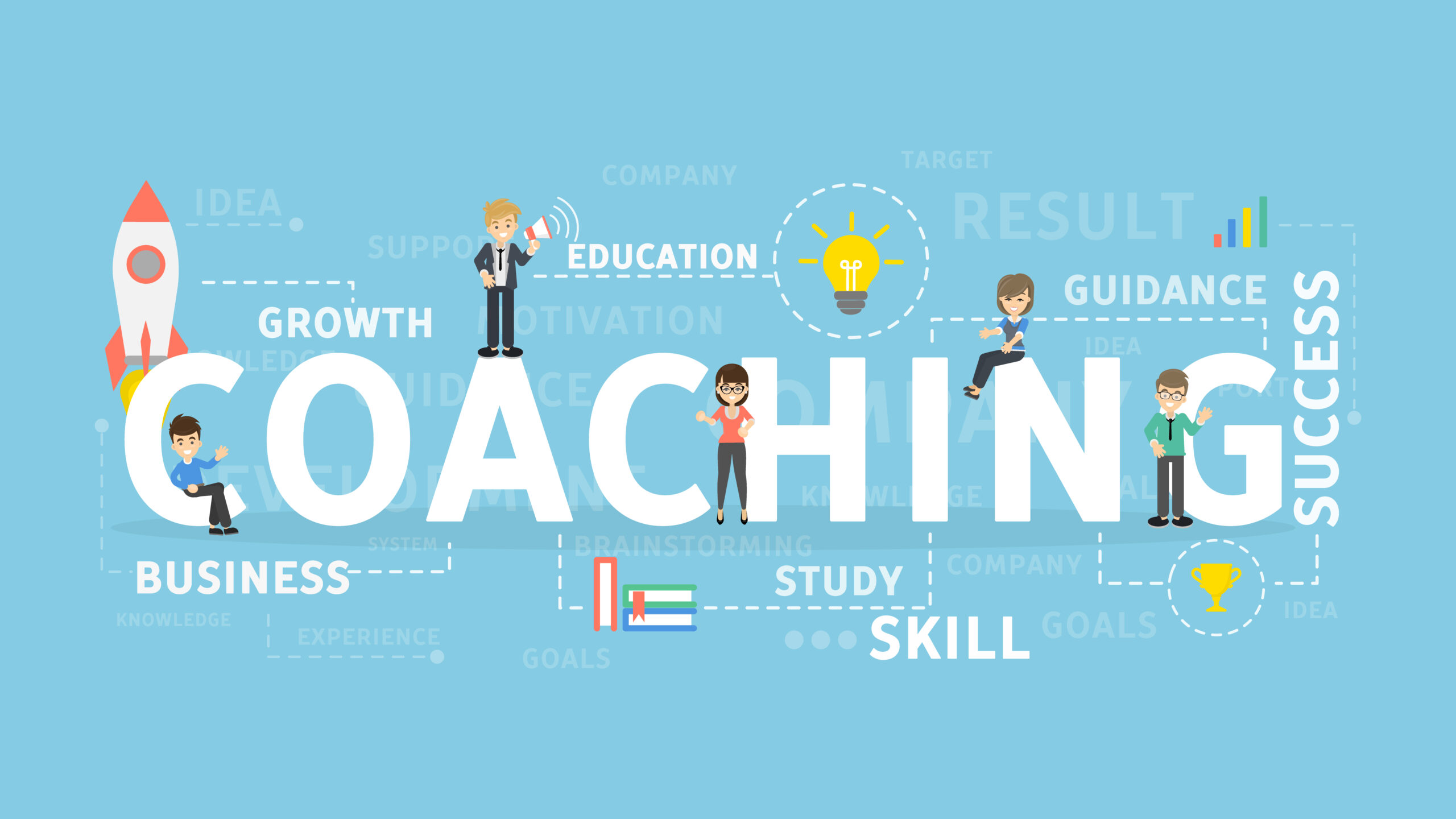You probably already have a pretty good idea of the roles of coaching and consulting, but many people have tried to blur the lines of the definition of each of these important roles. This can lead to a situation where clients don't get the exact services they need. This doesn’t mean that one is better than the other; both coaching and consulting are focused on helping a person with problems in their business and lives. The big difference between coaching and consulting is how they help.
To help you better understand the difference between coaching and consulting, their similarities, and how to choose the right approach, we’ve prepared a detailed comparison that covers all important aspects including the pros and cons of each. But first things first, let’s start with the definitions of both consulting and coaching.
What Is Coaching?
Coaching helps people progress, elevate, or move forward with action. The goal of coaching is to help clients solve problems and find better solutions. E.g. most leaders hire a coach when they have an employee or team that adds value but isn't living up to their true potential.
Coaches help clients achieve their goals by identifying what personal challenges are affecting them. They do this by using their own experience and by changing the environments of their clients.
Consider an example: Sports coaches don't run hundred-yard sprints to help their clients, nor do they do a dive to show their clients what to mimic. Instead, they let their clients do it and then give them advice to improve afterward. Then, they let their clients compete. This level of independent entrepreneurial growth is the key factor in all types of business coaching.
What Is Consulting?
Consulting focuses on assessing problems and giving solutions by telling the company, individuals, or employees what they need to do and what they need. Typically, consultants' expertise is their main way of delivering results. Their success is often measured by the solutions they provide, rather than whether the client listens to their solution.
Consultants aren’t responsible for whether their clients will apply ideas, and they’re not held accountable for how clients will use those ideas. They have the option to support the implementation process using advice, or even by helping to lead, but they aren't accountable at the end of it all. The main goal is to help a client by providing another point of view on what causes problems, and then recommend solutions to resolve those issues.
The Difference Between Coaching and Consulting
The main difference between coaching and consulting is who does the work to change the company. If you’re a consultant, you will most likely work to resolve a specific problem in a client’s business. A coach, on the other hand, will guide businesses through a problem while showing them how to solve similar problems in the future, alone.
Consultants’ and coaches’ differences in approaching data
Consultants often choose to administer rigorous measurements and tests. They use quantitive data and metrics to come up with specific recommendations for future actions. A coach may choose to give assessments but are often less reliant on data and more reliant on the meaning of that data. Sometimes, clients need raw data, so consulting sessions would be best.
On the other hand, clients often want an idea of what their end goal is, and what they should value during any particular challenge. Sometimes in these cases, finding data can be quite difficult, and a coach is the right choice to help implement solutions.
Coaches ask questions and consultants provide solutions
Business coaches ask more questions than they give answers, and any good business consultant should do the same. The main difference is how they ask questions.
Usually, consultants enter an "information gathering" mode when they ask questions, whereas good coaches are naturally curious. This is one of the main reasons that having a coach helps. On the other hand, some clients prefer actionable solutions right away, instead of beating around the bush. Consultants are great in that case!
Even though clients hire both coaches and consultants for their expertise, they may often feel uncomfortable sharing the problems of their business. The truth is, they will often try to cover up the problems to make themselves look better, but that same client will open up and answer questions when talking to a naturally curious coach.
Guidance vs. authority
Business coaching focuses on guiding a company to success, whereas business consultants will find specific solutions to specific areas of problems. In theory, the main difference between the two lies in what each person is working on.
A coach tries to improve clients, whereas a consultant works on solving a problem in their business.
- Coaching helps by equipping clients with strategies that will help them do better in the future and even avoid some problems.
- Consulting, on the other hand, provides clients with tools and even helps with the execution of strategies that solve specific problems.
This leads us to the next difference between consulting and coaching:
Building capacity vs. solving a problem
The main problem that coaching solves is capacity. Coaching’s purpose is to create capacity. And consulting is designed to help a client solve a particular challenge. These two solutions are similar but often have different ways of getting to the same end goal.
- Consultants often help their clients resolve a specific problem and permanently increase operations, reputation, or their competitive position.
- Coaching, instead, helps build leadership skills and team confidence so that a company can work effectively on solving current and future problems.
Different types of change
Whenever a client needs support for behavioral changes, such as improving time management, coaching is often the go-to tool. Consulting usually doesn't focus on these behavioral types of changes and instead focuses on industry-specific solutions. Because of this important difference, a coach will often change their approach from client to client, whereas a consultant may very well be able to use the same solutions on multiple occasions.
The most successful coaches and consultants use a powerful scheduling app
If you're a coach or consultant looking for the perfect scheduling solution, Trafft is the ultimate scheduling software tailored for consultants and coaches.
Trafft goes over and beyond to give you and your clients that perfect booking experience. It offers a wide range of powerful features designed to streamline scheduling, boost your coaching and consulting business, and enhance the client experience.
Why is Trafft the go-to choice for successful consultants and coaches?
Trafft is a coaching and consulting management software that is perfect for those who want to streamline their booking experience both for their staff and their clients.
Trafft's platform is designed to minimize scheduling errors, ensuring that your coaching and consulting sessions run smoothly. You can rely on Trafft to keep your schedule organized and efficient.
Enjoy support for multiple locations, multi-language capabilities, recurring appointments, and group bookings. You can easily reschedule sessions, set up appointment reminders, and customize booking forms to match your consulting and coaching services.
Trafft also provides consultants and coaches like you with an insightful business dashboard that helps you gather essential metrics. These metrics are invaluable for making data-driven decisions and improving your practice.
Don't wait any longer; sign up for Trafft for free today and experience why it's the best scheduling solution for consultants and coaches. Supercharge your business and provide your clients with the seamless booking experience they deserve.
P.S. Trafft offers the most generous free plan and paid plans suitable for coaching and consulting businesses of all sizes.
You can’t lose anything by signing up for free, but by exploring Trafft’s plans you’ll make sure not to miss out on any important feature that’s going to make your life easier!
Types of expertise
A consultant's expertise is usually their main source of assistance with their clients, but that isn't to say that coaches don't have expertise, either. The difference between coaches and consultants is when they share it. Usually, consultants will share their expertise right when they open the door. Remember: consultants have experience in solving these kinds of problems and they’ve usually already walked in the client’s shoes.
Coaches, on the other hand, first tend to look for what their client wants and what is going on. Once they have found the information they need, they share their expertise in a targeted manner, helping a client find exactly what they need.
Consultants and coaches focus on different things
The focus of coaching is on the client's inner abilities and helping them to identify and improve those abilities. They explore possibilities together with clients, while consultants create possibilities. They focus on the problem that needs attention immediately. This often means that a consultant's work is more data-driven, with results that are easier to measure and quantify.
Consulting offers more strategic advice than coaching
When clients want to find answers to their strategic business problems (such as how to improve marketing or sales flow), they usually hire a consultant. The consultant they hire has subject matter expertise, for example, they’re marketing or sales consultants.
Consultants focus much more time on recommending solutions based on their expertise. This helps clients to have more possible solutions for the future and more options for the problem they're dealing with now.
Coaching on the other hand may be slow and can’t provide solutions immediately. Why? Because coaches focus on clients and their individual needs rather than on the problem. When they do give advice, it’s more about shifting the client's mindset, and focus and helping them grow.
"You Know" vs. "I Know"
A good coach will work with clients as their equals, or at least train them so clients can get to that level. The coach is there, not to tell them the answers, but to help clients find the answers by themselves. Coaches believe that their clients are experts in their fields. They find the right question to ask, which then leads to the right answer. A consultant, on the other hand, will simply provide solutions and the right answers based on an analysis of the situation, their experience, and expertise. Consultants are the experts in their field, and that’s why businesses usually hire them.
Modes of operation
Coaching is based on developing a client's ability to solve the problem themselves by using tools the coach has given to them, such as goal-setting strategy and accountability. Consulting instead helps clients solve their problems then and there.
Contact person
Even if only one person or company is paying them, a consultant will usually work with more than one person. Usually, consultants work with a team, group, board, or department.
Coaches instead work one-on-one, and on rare occasions, entire teams, and even then usually on an individual level. This allows coaches to help employees improve individually, which can make a world of difference for the business.
Truth vs. execution
Above all, the difference between coaching and consulting lies in truth vs. execution. Coaches try to pull answers from their clients, whereas consultants tell their clients what to do. When clients hire a coach, they walk away with the right strategies to find solutions to their problems. When they hire a consultant, clients get the tools that support them to move forward. Both are very useful, depending on the client’s goal or intention.
Coaching vs Consulting: Similarities
Now that we have discussed the differences, let's also discuss some of the similarities that the two professional coaches and consultants have and how they can both help people and businesses.
Both coaches and consultants deliver results because of their expertise in their fields. They are both skilled in sharing knowledge in important areas. They work in all areas of a company, from C-suite to individual teams. Both are even well-versed in the pros and cons of transformation options and the pros of organizational design.
Business coaching and consulting also aim for the same result: a better company. Both roles are invested in helping their clients succeed, and both offer support in any way that they can.
Consulting vs Coaching Pros & Cons
We now know the similarities and differences between coaching and consulting. But to determine which approach is a better fit, it’s crucial to understand the advantages and disadvantages of each.
Consulting pros
- Consulting takes a more strategic, data-driven approach.
- Consulting provides actionable solutions to specific problems.
- Consultants are subject-matter experts and have extensive experience in the field they consult in.
- Clients trust consultants because of their expertise in the field and they’re confident consultant will solve their problems.
- Consulting results are measurable and easier to quantify.
Consulting cons
- Once the consultant gives a solution to the problem, that’s where their job ends.
- Consultants compared to coaches offer short-term solutions, without working on similar problems or long-term strategies to resolve future issues.
- Consulting focuses on the problem and solution, not on the client.
Coaching pros
- Coaching focuses on the bigger picture and helps clients to solve similar problems by changing their mindset.
- Coach’s number one priority is their clients, the roots of their problems, and how they can guide them to resolution.
- By focusing on the client, coaches get to know their clients better and understand the causes of their problems.
Coaching cons
- Less strategic approach than consulting.
- Coaches guide you through resolving the problem by asking you questions, not by providing solutions.
- Coaching doesn’t rely on data as much, and results are more of a qualitative nature than measurable.
Coaches vs Consultants: Which Career Should You Choose and Can You Be Both?
You have a clear picture and understanding of the differences between consultants and coaches. But there are still questions you need answers to, right? Let’s explore who is better suited to be a coach, and who would be better suited for a consultant career.
You should be a coach if:
- You want to provide people with long-term assistance with goals.
- You want to help them develop leadership skills.
- You want to gain insights for long-term growth.
The final results of working with a coach are personal growth, information on the client’s next steps, and the framework for the business.
You should become a consultant if:
- You want to help businesses start, grow, or improve their marketing strategies.
- You want to help them set actions for the future.
- You want to help them attract ideal clients.
The final results of working with a consultant are tools for future problems, extra support for gaps in your capabilities, and a better framework for the future.
Of course, both coaching and consulting can help any company, but in different ways. Knowing the difference between the two will help you choose your perfect career path. Discussing coaching vs consulting is like deciding between a hammer and a screwdriver, both are great tools, but both help in different ways.
As time passes, the line between coaching and consulting becomes more and more blurred. As you can see, there are many differences between coaching and consulting, but also many similarities. They overlap more and more every day. If you can’t decide, you’ll be happy to hear that there is a new career path emerging "Coachsulting". It’s a perfect blend of coaching and consulting services that you can provide to the same client at the same time.
And if you enjoyed reading this article about coaching vs. consulting, you might want to find out more about the coaching business model, creating an efficient coaching schedule, being a time management coach, and using coaching apps to streamline and grow your business.
FAQs About Coaching vs Consulting
1. What is the difference between a consultant and a coach?
Coaching assists individuals or companies in developing skills to solve current and future problems by utilizing different strategies such as goal setting, personal growth, etc. Consulting is more oriented toward providing actionable solutions to client’s problems and helping them with execution.
2. Which one is more suitable for business improvement: coaching or consulting?
The type of business problem will determine whether coaching or consulting is the best option. Coaching could be a better option if the issue involves personal development or the development of skills. Consulting might be a better option if the issue is unique to a certain corporate function or procedure. To get the best outcomes, though, it could occasionally be necessary to combine coaching and consulting.
3. How do coaching and consulting differ in terms of their goals and objectives?
The goals and objectives of coaching and consulting are different. Through developing skills, encouraging self-awareness, and achieving goals, coaching strives to boost personal and professional development. By offering professional guidance and solutions to enhance corporate performance, consulting strives to address particular business difficulties. While consulting focuses more on solving particular corporate challenges, coaching is more on personal development.
4. Can coaching and consulting be used interchangeably in a business context?
In a business setting, coaching and consulting cannot be used interchangeably. While they both strive to enhance company outcomes, their methods, goals, and objectives are different. While consulting focuses more on finding answers to particular business challenges, coaching is more concerned with the growth of the individual or team.
5. How does the coaching process differ from the consulting process?
The coaching process entails assisting people or teams in determining their objectives, coming up with plans to achieve them, and receiving criticism and support to get over challenges.
In the consulting process, the consultant identifies unique business difficulties, analyzes the data, suggestions are made, and solutions are put into practice. Whereas consulting focuses more on corporate improvement, coaching is more on personal growth.
6. Are coaching and consulting mutually exclusive or can they be combined?
In some circumstances, combining coaching and consulting can lead to the best outcomes. For instance, a consultant might make recommendations to handle a particular business situation, whereas a coach might work with people or teams to help them acquire the abilities and tactics necessary to put those recommendations into practice.
7. In what circumstances would you recommend coaching over consulting or vice versa?
When improving team performance, fostering personal growth, or developing abilities, we would recommend coaching. When the objective is to address particular business difficulties and offer qualified advice and solutions to enhance corporate performance, we recommend consulting.
The type of problem and the desired result will determine whether coaching or consulting is the best option.
8. Do coaches and consultants have different skills and expertise?
Consultants and coaches have varying levels of training and experience. Coaches are prepared to assist individuals or groups in being more self-aware, setting objectives, and growing personally and professionally.
In order to improve corporate performance, consultants are trained to examine data, spot business difficulties, and offer knowledgeable counsel and solutions.
9. Can a consultant also be a coach or vice versa?
While consulting and coaching need separate knowledge and abilities, some people may have both. So it's crucial to recognize the distinctions between coaching and consulting and to use the best strategy based on the nature of the issue.
10. How do coaching and consulting impact business performance and outcomes?
Coaching and consulting can significantly impact business performance and results. While consulting can offer professional guidance and solutions to solve certain business difficulties, coaching can help people develop their abilities, foster self-awareness, and improve team performance.
The type of problem and the desired result will determine whether coaching or consulting is the best option. To get the best results, a mix of coaching and consulting may be necessary.
11. Is coaching a form of consulting?
Coaching isn’t a form of consulting, but rather a specific approach to personal development and business challenges. Consulting focuses on problem-solving and data, while coaching focuses on personal development and similar strategies.






